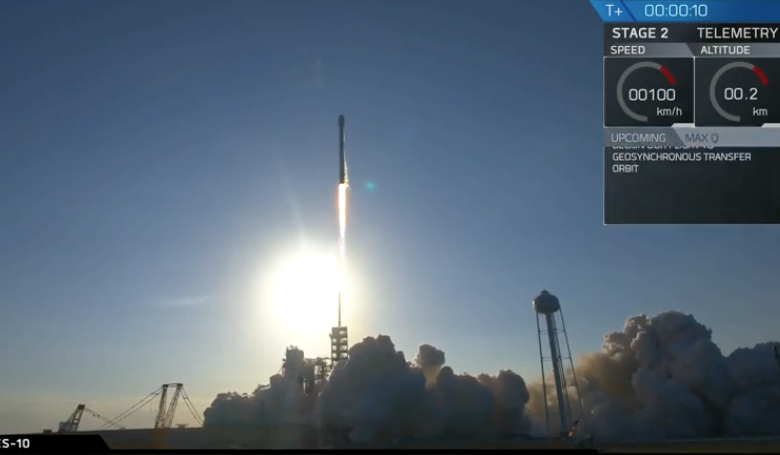Success for SpaceX as the company is the first to use a ‘flight-proven’ rocket to deliver SES’s commercial communications satellite to a Geostationary Transfer Orbit (GTO).
The SES-10 mission marked an historic milestone as SpaceX seeks to prove that a rapid reusability of an orbital class rocket is possible. The Falcon 9’s first stage for this mission was previously used on the successful CRS-8 mission in April 2016.
Following a successful main engine cutoff and first stage separation, Falcon 9’s 14-story reusable core returned to Earth and landed on the “Of Course I Still Love You” droneship that was stationed in the Atlantic Ocean.
Naturally, now that the rocket has successfully returned to Earth in one piece again, it means that it could be used for a third launch in the near future.
Speaking on the company’s live stream feed shortly after the landing, SpaceX CEO Elon Musk said, “it means you can fly and refly an orbital class booster, which is the most expensive part of the rocket. This is going to be, ultimately, a huge revolution in spaceflight.”
Although this Falcon 9 rocket has taken up to four months to get to a stage of reusability, Musk said that a next goal would be to significantly shorten the turnaround time for a relaunch – perhaps to just 24hrs – another momentus milestone for SpaceX if it can be achieved.
It was remarked that the Falcon 9 relaunched yesterday will be donated to the Cape Canaveral Spaceport for display, however future boosters will be expected to fly up to ten times with no refurbishment and about 100 times with moderate maintenance and reconditioning.
Musk’s vision of recycling rockets to lower the cost of access to space crossed a threshold yesterday, but did his client see a monetary benefit as promised?
“We did receive a discount. Obviously to fly this there was some interest and there was some incentive to do so,” said Martin Halliwell of SES in a press conference held before the launch. “But it is not just the money in this particular case. It’s really, ‘let’s get this proof-of-concept moving.’ Someone has to go first here and SES has a long history of doing this.”
Although only a modest discount of 10 percent will be applied to the first few relaunches of a Falcon 9 said SpaceX president Gwynne Shotwell, as the company needs to recoup development costs for the reusable first stage, potential customers could see a saving of up to 30 percent for a launch that starts at $60 million. Every little helps then.











